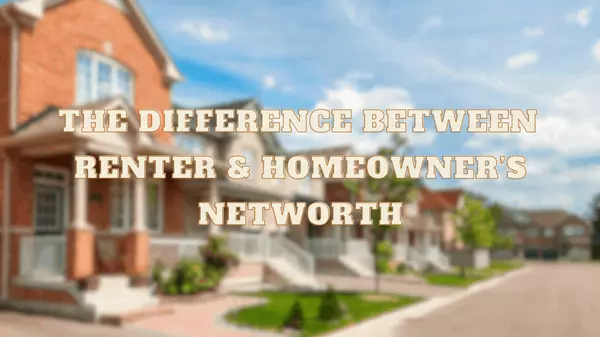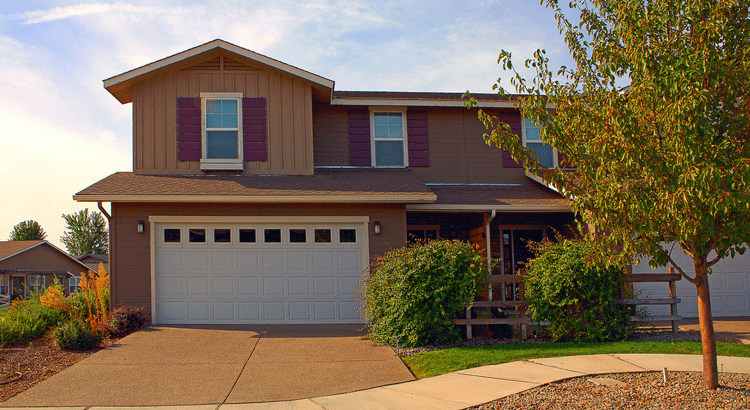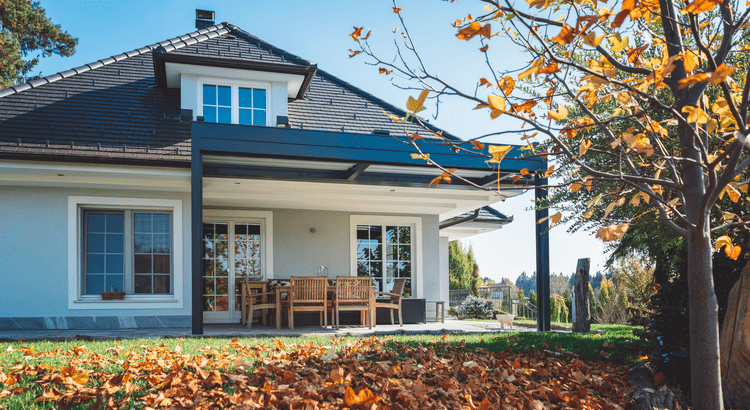
Don’t Let These Two Concerns Hold You Back from Selling Your House
Don’t Let These Two Concerns Hold You Back from Selling Your House If you’re debating whether or not you want to sell right now, it might be because you’ve got some unanswered questions, like if moving really makes sense in today’s market. Maybe you’re wondering if it’s even a good idea to move right now. Or you’re stressed because you think you won't find a house you like. To put your mind at ease, here’s how to tackle these two concerns head-on. Is It Even a Good Idea To Move Right Now? If you own a home already, you may have been holding off because you don’t want to sell and take on a higher mortgage rate on your next house. But your move may be a lot more feasible than you think, and that’s because of your equity. Equity is the current market value of your home minus what you still owe on your loan. And thanks to the rapid appreciation we saw over the past few years, your equity has gotten a big boost. Just how much are we talking about? See for yourself. As Dr. Selma Hepp, Chief Economist at CoreLogic, explains: “Persistent home price growth has continued to fuel home equity gains for existing homeowners who now average about $315,000 in equity and almost $129,000 more than at the onset of the pandemic.” Here’s why this can be such a game-changer when you sell. You can use that equity to put down a larger amount on your next home, which means financing less at today’s mortgage rate. And in some cases, you may even be able to buy your next home in cash, avoiding mortgage rates altogether. The bottom line? Your equity could be the key to making your next move possible. Will I Be Able To Find a Home I Like? If this is on your mind, it’s probably because you remember just how low the supply of homes for sale got over the past few years. It felt nearly impossible to find a home to buy because there were so few available. But finding a home in today’s market isn’t as challenging. That’s because the number of homes for sale is growing, giving you more options to choose from. Data from Realtor.com shows just how much inventory has increased – it's up almost 30% year-over-year (see graph below): And even though inventory is still below pre-pandemic levels, this is the highest it’s been in quite a while. That means you have more options for your move, but your house should still stand out to buyers at the same time. That’s a sweet spot for you. It’s important to note, though, that this balance varies by local market. Some places may have more homes for sale than others, so working with a local real estate agent is the best way to see what inventory trends look like in your area. Bottom Line If you’re thinking about selling, hopefully these concerns haven’t kept you up at night. With this information, you should realize you don’t have to let the what-if’s delay your move anymore. Let’s connect so you have the data and the local perspective you need to move forward.

THE DIFFERENCE BETWEEN RENTER AND HOMEOWNER'S NETWORTH
The Wealth-Building Power of Homeownership: A Closer Look at Net Worth Differences Between Renters and Homeowners When it comes to financial security and wealth building, one of the most impactful choices people face is whether to rent or own a home. A recent report highlighted in a First American infographic underscores a significant point: homeowners, on average, enjoy a net worth nearly 40 times greater than renters. Let's dive into why this wealth gap exists, how it grows over time, and what potential homebuyers can gain by investing in property. The Foundation of Wealth: Equity Accumulation Mark Fleming, Chief Economist at First American, states it clearly: "In deciding whether to rent or own, it’s important to remember the wealth-building power of equity accumulation." Unlike renters, who pay monthly rent without building any ownership stake, homeowners benefit in two powerful ways: They pay down their mortgage over time. Their home’s value appreciates, building equity. This equity accumulation—the difference between what is owed on the home and its market value—creates a safety net that grows with the property’s worth. Even if the housing market fluctuates, homeowners still benefit from having an asset that typically appreciates over the long term. By the Numbers: A Staggering Wealth Gap According to the data, the wealth gap between homeowners and renters continues to grow as home values rise. The average net worth of a homeowner today is around $396,200, while the average renter has only $10,400 in net worth. This enormous gap illustrates how homeownership can become a primary vehicle for wealth accumulation, especially as property values increase over time. Why Homeownership Wins Over Renting Monthly Payments Become an Investment: Renters pay a set amount each month to live in a space, but none of that money goes toward owning an asset. In contrast, each mortgage payment a homeowner makes reduces their loan balance, effectively “paying themselves” by building equity. Appreciation Increases Wealth: Historically, real estate values tend to appreciate. While not guaranteed, owning a property gives homeowners the opportunity to benefit from the increasing market value. Over the years, even modest appreciation can lead to significant gains. Stability and Predictability: Unlike renting, where landlords can raise rent annually or more frequently, owning a home allows for predictable costs, especially with a fixed-rate mortgage. This predictability enables better financial planning and reduces stress about potential rent hikes. Homeownership as a Hedge Against Inflation As inflation drives up the cost of goods and services, property values also tend to rise. For homeowners, this means that while everyday costs may be increasing, their home’s value could be appreciating alongside inflation. Renters, on the other hand, may face increased rental rates as property owners adjust to market conditions, ultimately impacting renters’ budgets and potential savings. Overcoming Homebuying Hurdles While the wealth-building benefits of homeownership are clear, many renters face obstacles in making the leap to buying a home. However, various programs exist to support first-time homebuyers, offering assistance with down payments, favorable loan terms, and educational resources. Exploring these options with a knowledgeable real estate agent or financial advisor can help make buying a home more attainable. How to Start Building Your Wealth Through Homeownership If you’re ready to take control of your financial future and build wealth through real estate, now is an ideal time to explore homeownership. Connect with a local real estate professional to discuss options, learn about available programs, and understand how to navigate the home buying process. As property values rise, so does the opportunity to grow your net worth. Final Thoughts The decision between renting and buying isn’t solely about lifestyle—it's about creating financial security and future wealth. With home values steadily increasing, the difference in net worth between renters and homeowners continues to widen. By choosing to own, you’re not just securing a place to live; you’re investing in a financial future that builds wealth over time. So, if you’re ready to start building equity and growing your wealth, consider the path to homeownership. It could be the key to transforming your financial well-being and establishing a legacy of wealth for years to come.

Should You Sell Your House or Rent It Out?
Should You Sell Your House or Rent It Out? When you’re ready to move, figuring out what to do with your house is a big decision. And today, more homeowners are considering renting their home instead of selling it. Recent data from Zillow shows about two-thirds (66%) of sellers thought about renting their home before listing, with nearly a third (28%) taking that possibility seriously. Compared to 2021, when fewer than half (47%) of homeowners considered renting before selling, it’s clear this trend is on the rise. So, should you sell your house and use the money toward your next home or keep it as a rental to build long-term wealth? Let’s walk through some important questions to help you determine the right path for your financial and lifestyle goals. Is Your House a Good Fit for Renting? Before you decide what to do, it's important to think about if it would make a good rental in the first place. For instance, if you’re moving far away, managing ongoing maintenance could become a major hassle. Other factors to consider are if your neighborhood is ideal for rentals and if your house needs significant repairs before it’s ready for tenants. If any of these situations sound familiar, selling might be a more practical choice. Are You Ready for the Realities of Being a Landlord? Managing a rental property involves more than collecting monthly rent. It’s a commitment that can be time-consuming and challenging. For example, you may get maintenance calls at all hours of the day or discover damage that needs to be repaired before a new tenant moves in. There’s also the risk of tenants missing payments or breaking their lease, which can add unexpected stress and financial strain. As Redfin notes: “Landlords have to fix things like broken pipes, defunct HVAC systems, and structural damage, among other essential repairs. If you don't have a few thousand dollars on hand to take care of these repairs, you could end up in a bind.” Do You Understand the Costs? If you’re considering renting primarily for passive income, remember, there are additional costs you should anticipate. As an article from Bankrate explains: Mortgage and Property Taxes: You still need to pay these expenses, even if the rent doesn’t cover all of it. Insurance: Landlord insurance typically costs about 25% more than regular home insurance, and it’s necessary to cover damages and injuries. Maintenance and Repairs: Plan to spend at least 1% of the home’s value annually, more if the house is older. Finding a Tenant: This involves advertising costs and potentially paying for background checks. Vacancies: If the property sits empty between tenants, you’ll lose rental income and have to cover the cost of the mortgage until you find a new tenant. Management and HOA Fees: A property manager can ease the burden, but typically charges about 10% of the rent. HOA fees are an additional cost too, if applicable. Bottom Line To sum it all up, selling or renting out your home is a personal decision. Let’s connect so you have a pro on your side to help you feel supported and informed as you make your decision.

More Homes, Slower Price Growth – What It Means for You as a Buyer
More Homes, Slower Price Growth – What It Means for You as a Buyer There are more homes on the market right now than there have been in years – and that could be a game changer for you if you’re ready to buy. Let’s look at two reasons why. You Have More Options To Choose From An article from Realtor.com helps explain just how much the number of homes for sale has gone up this year: “There were 29.2% more homes actively for sale on a typical day in October compared with the same time in 2023, marking the twelfth consecutive month of annual inventory growth and the highest count since December 2019.” And while the number of homes on the market still isn’t quite back to where it was in the years leading up to the pandemic, this is definitely an improvement (see graph below): With more homes available for sale now, you have more options to choose from. As Hannah Jones, Senior Economic Research Analyst at Realtor.com, explains: “Though still lower than pre-pandemic, burgeoning home supply means buyers have more options . . .” That means you have a better chance of finding a house that meets your needs. It also means the buying process doesn’t have to feel quite as rushed, because more options on the market means you’ll likely face less competition from other buyers. Home Price Growth Is Slowing When there aren’t many homes for sale, buyers have to compete more fiercely for the ones that are available. That’s what happened a few years ago, and it’s what drove prices up so quickly. But now, the increasing number of homes on the market is causing home price growth to slow down (see graph below): In certain markets, the number of available homes has not only bounced back to normal, but has even surpassed pre-pandemic levels. In those areas, home price growth has slowed or stalled completely. As Lance Lambert, Co-Founder of ResiClub, explains: “Generally speaking, housing markets where active inventory has returned to pre-pandemic 2019 levels have seen home price growth soften or even decline outright from their 2022 peak.” Slower or stalled price growth could give you a better chance of finding something within your budget. As Dr. Anju Vajja, Deputy Director at the Federal Housing Finance Agency (FHFA), says: “For the third consecutive month U.S. house prices showed little movement . . . relatively flat house prices may improve housing affordability.” But remember, inventory levels and home prices are going to vary by market. So, having a real estate agent who knows the local area can be a big advantage. They can help you understand the trends in your community, which can make a real difference in finding a home that fits your needs and budget. Bottom Line More housing options – and the slower home price growth they bring – can help you find and buy a home that works for your lifestyle and budget. So don’t hesitate to reach out if you want to talk about the growing number of choices you have right now.
Categories
Recent Posts










